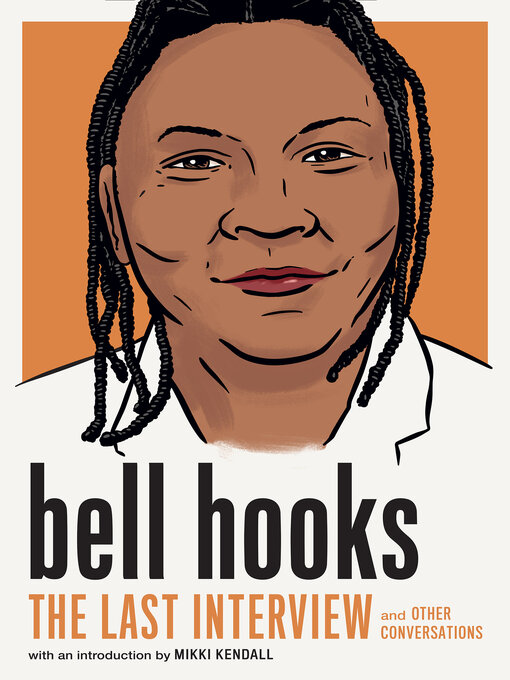- Popular Magazines
- Just Added
- Cooking & Food
- Fashion
- Health & Fitness
- Home & Garden
- News & Politics
- See all magazines collections
“This new collection is essential reading for both longtime readers of hooks and new fans seeking to learn more about her groundbreaking contributions to cultural and intellectual movements.” - Electric Lit
"Wide-ranging and insightful, this makes for a solid primer on hooks’s ideas." —Publishers Weekly
"I will not have my life narrowed down. I will not bow down to somebody else's whim or to someone else's ignorance."
—bell hooks
bell hooks was a prolific, trailblazing author, feminist, social activist, cultural critic, and professor. Born Gloria Jean Watkins, bell used her pen name to center attention on her ideas and to honor her courageous great-grandmother, Bell Blair Hooks.
hooks’s unflinching dedication to her work carved deep grooves for the feminist and anti-racist movements. In this collection of 7 interviews, stretching from early in her career until her last interview, she discusses feminism, the complexity of rap music and masculinity, her relationship to Buddhism, the “politic of domination,” sexuality, and love and the importance of communication across cultural borders. Whether she was sparking controversy on campuses or facing criticism from contemporaries, hooks relentlessly challenged herself and those around her, inserted herself into the tensions of the cultural moment, and anchored herself with love.
-
Creators
-
Series
-
Publisher
-
Release date
July 18, 2023 -
Formats
-
Kindle Book
-
OverDrive Read
- ISBN: 9781685890803
-
EPUB ebook
- ISBN: 9781685890803
- File size: 2607 KB
-
-
Languages
- English
-
Reviews
-
Publisher's Weekly
May 22, 2023
The stimulating latest in Melville’s Last Interview series collects six conversations—spanning from 1989 to 2017—with feminist theorist bell hooks, who died in 2021. Speaking with sociologist Yvonne Zylan in 1989, hooks reflected on the contentious reception to a lecture she had given earlier that year at Yale Law School, maintaining that “a lot of the hostility that people feel towards me is that we simply do live in a world where women don’t often assert power, and that people get pissed off when women do.” Elsewhere, hooks critiques sexism in the writings of Thich Nhat Hanh, arguing in an interview with Tricycle magazine that the Buddhist monk’s disapproval of casual sex conforms with “very traditional” notions of women’s propriety. In a 1994 interview for Bomb Magazine, she castigates gangsta rap for its misogynistic lyrics even as she “embrace the rage... and the sense of powerlessness that undergirds it.” Other conversations touch on hooks’s ambivalence about her Kentucky upbringing, the importance of intersectionality, and obstacles to fulfilling relationships, demonstrating the incisive analysis of race and gender that earned her a devoted following. Wide-ranging and insightful, this makes for a solid primer on hooks’s ideas. -
Kirkus
June 1, 2023
A controversial public intellectual speaks her mind. This collection of seven interviews with prominent Black feminist, activist, and theorist bell hooks (1952-2021), introduced by diversity consultant and essayist Mikki Kendall, reveals the evolution of hooks' thought from 1989 to 2017 as she reflected on important social and political issues of her time. In 1978, hooks, a college professor of English, changed her name from Gloria Jean Watkins as a way of affirming her identity--and honoring a feisty ancestor. "Gloria Jean, given to me--really reflects how much my parents wanted me to be a very feminine, Southern belle type girl," hooks told an interviewer, "and I think that in order to find my voice and use it, I had to use the name of my great-grandmother on a maternal side--bell hooks--in order to bring a self into being that my parents and my home were not nurturing." That self comes across as caring, passionate, and defiant; in more than 30 books and public presentations, hooks has been likely to "hit raw nerves, delving into the possibilities of culture as a place of resistance to white supremacy, capitalism and patriarchy." Hooks contextualizes many of her books, including Where We Stand: Class Matters, Feminism Is for Everybody, and even her children's book Happy To Be Nappy. She discusses her eagerness to reach audiences outside of academia, which once led her to appear on the Ricki Lake talk show, where, she admitted, she was "treated like shit." The interviews range over many topics, including hip-hop, Buddhism, sex, love, gender, lesbianism, the environment, the meaning of intersectionality, and capitalism. "Any system that encourages us to think about interdependency, and to be able to use the world's resources in a wiser way, for the good of the whole," hooks asserts, "would be better for the world than capitalism." A candid self-portrait of an important 20th-century thinker.COPYRIGHT(2023) Kirkus Reviews, ALL RIGHTS RESERVED.
-
Formats
- Kindle Book
- OverDrive Read
- EPUB ebook
Languages
- English
Loading
Why is availability limited?
×Availability can change throughout the month based on the library's budget. You can still place a hold on the title, and your hold will be automatically filled as soon as the title is available again.
The Kindle Book format for this title is not supported on:
×Read-along ebook
×The OverDrive Read format of this ebook has professional narration that plays while you read in your browser. Learn more here.


